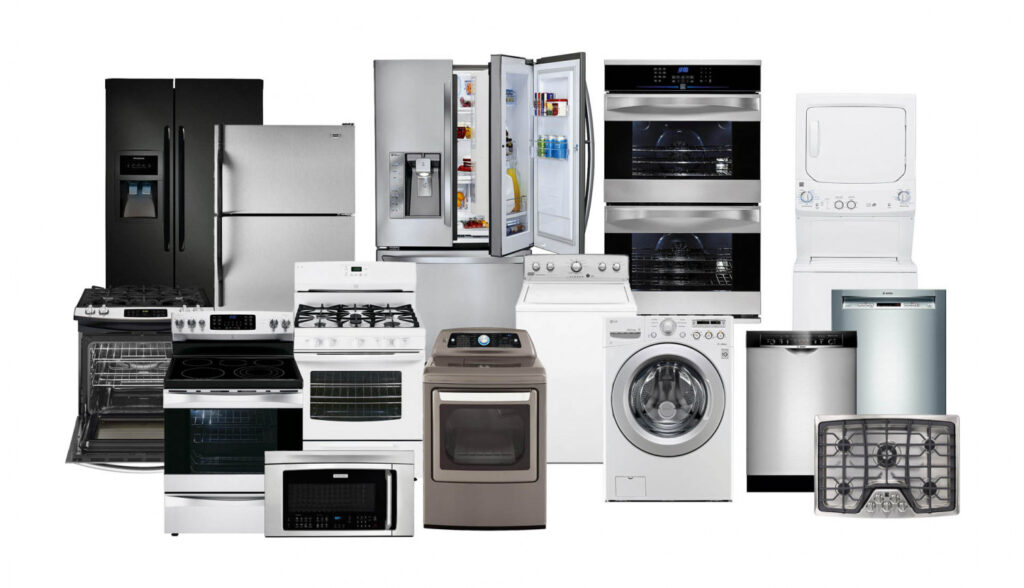
10 Must-Know Appliance Safety Tips to Protect Your Home
Home appliances are a part of our daily routine—but they can be very dangerous if not maintained properly or used with caution. Ranging from electric fires to gas leaks, internal appliance dangers go un-noticed till it’s too late. The risks may be petty, but they can result in significant accidents and costly repairs over time. Your microwave, refrigerator, oven, dryer, and other appliances work tirelessly each day—and just like any device, they need some regular care and attention.
That’s why it’s essential to learn about the most frequent safety hazards and how to avert them. In this blog, we’ll go over 10 essential Appliance Safety Tips that each homeowner must know. From a malfunctioning oven to a clogged dryer vent, these tips will assist you in making your home safer and your appliances more efficient.
1. Don’t Ignore Frayed Power Cords
A damaged or frayed cord is hazardous and can ignite fire. It can lead to electrical shorts, shocks, or even ignite fires—particularly when exposed to combustible materials. Cords over time get weakened through constant flexing, dampness, or exposure to heat.
Tip: Inspect cords on appliances such as toasters, microwaves, and coffee makers regularly. If damage is found, unplug the appliance right away and replace the cord or the appliance.
Never use tape to cover a frayed cord—it is a temporary solution and will not remove the hazard.
2. Don’t overload Outlets
Overloading an outlet with too many appliances or plugged into one power strip may heat up your electrical system and raise the risk of electrical fires. High-wattage appliances such as space heaters and ovens are especially hazardous when overloaded.
Tip: Get power strips with surge protection, and never string them together (plugging one strip into another). Space out large appliances to different outlets and have an electrician install more dedicated circuits if necessary.
3. Regularly Clean Dryer Vents
Dryer vent clogging with lint is one of the most common causes of house fires. Lint builds up over time, constricting airflow and causing heat buildup that is highly flammable.
Tip: Clean out the lint filter after each load. Every year, take down and clean the whole dryer vent hose and verify that the outside exhaust is not clogged. If you find that clothes are drying more slowly, it might be an indication that the vent is in need of service.
4. Check Appliance Recalls
Manufacturers sometimes recall appliances due to design flaws or safety defects. These recalls are meant to prevent accidents, but many homeowners remain unaware of them.
Tip: Register your new appliances online immediately after purchase. You’ll get notified if a recall is issued. Visit websites like the U.S. Consumer Product Safety Commission to check your existing appliances and stay informed.
Implementing practical appliance safety tips not only helps you avoid unexpected hazards but also ensures your devices operate efficiently for years. With just a little effort, these appliance safety tips can make a big difference in protecting your home and loved ones from preventable accidents.

5. Never Leave Cooking Unattended
Unsupervised cooking is one of the leading causes of kitchen fires. Boiling over, overheating oils, or food left in the oven can turn into fire hazards fast.
Tip: Stay in the kitchen while cooking, and if using high heat, particularly. If you need to leave, turn off the appliance or have someone stand watch. Keep combustible items such as towels and paper a distance from burners and heating sources.
6. Be Aware of Gas Odors
A slight gas odor near appliances such as stoves or dryers may indicate a leak—a highly dangerous condition that may cause explosions or carbon monoxide poisoning.
Tip: When you smell gas, don’t use a match or electrical switches. Switch off the appliance and gas supply at once, ventilate with open windows, leave your house, and contact a professional technician or the gas company.
7. Keep Water Away from Electrical Appliances
Water and electricity do not mix. Any exposure of water to appliances that are plugged in can lead to electric shock or short circuits.
Practicing smart appliance safety tips can make a big difference in preventing costly and dangerous home accidents.
Tip: Dry appliances and avoid using extension cords in wet locations such as kitchens or bathrooms. Never hold a plugged-in appliance with wet hands, and always dry your hands completely before using any electrical device.
8. Install Carbon Monoxide Detectors
Gas-burning appliances such as ovens, water heaters, and furnaces can emit carbon monoxide—a colorless, odorless gas that is deadly when inhaled over time.
Tip: Place detectors close to sleeping areas and gas-burning appliances. Test monthly and replace batteries every year. If your alarm sounds, get out of your home at once and call emergency services.
9. Have Regular Maintenance
Abandoned appliances can accumulate dangerous faults with time. Even premium equipment can deteriorate if not given regular maintenance, resulting in expensive repairs and damage.
Staying proactive with appliance safety tips is one of the smartest ways to protect your home and loved ones. By following trusted appliance safety tips, you can avoid costly damage, reduce the risk of accidents, and enjoy peace of mind year-round.
Tip: Have certified technicians inspect and maintain your household’s large appliances every year, particularly your HVAC system, oven, fridge, and clothes dryer. Maintenance can prevent issues from arising and prolong the lifespan of your appliances.
10. Inform Your Household About Appliance Safety Tips
All members of your household must learn to use appliances safely. Ignorance is usually the source of accidents, particularly children and old relatives.
Tip: Educate your household members on appliance safety fundamentals, such as not pulling the cord, switching off gadgets when not utilized, being able to recognize warning signs of malfunction, and letting them know something is amiss if they smell or hear unusual noises. Establish precise guidelines on what and when to use specific appliances.The U.S. Fire Administration shares additional appliance safety tips to help reduce the risk of household fires.

FAQs: Appliance Safety Tips
Q1: How frequently should I look for appliance recalls?
At least every 6 months or when you read or hear about a manufacturer recall in the news. You can even subscribe to email notifications from official safety websites.
Q2: Is it safe to use extension cords with appliances?
Only temporarily. Heavy-duty appliances must be plugged directly into wall outlets. Always use cords with the appliance’s power requirement rating.
Q3: Do small appliances cause fires?
Yes. Irons, toasters, and heaters are frequent perpetrators, particularly if unattended or with poor wiring.
Q4: Do I need to unplug appliances when not in use?
Yes, particularly the smaller ones. It conserves energy, slows down wear, and keeps the risk of fire low. Employ smart plugs for extra security.
Q5: What are the signs that an appliance is not safe?
Watch for indications such as burning odors, sparks, erratic performance, overheating, or unusual noises. They are warning signs that something’s amiss.
Conclusion
appliance safety tips is more than keeping your gadgets safe—it’s about keeping your house and everyone in it safe. From keeping a fire from starting to keeping a gas leak from happening, from educating your kids on how to use a microwave to locking cabinets and drawers, small steps make a huge difference in home safety.Explore more practical appliance safety tips in our guide on DIY Appliance Repair for Homeowners.
By adhering to these 10 fundamental appliance safety tips, you can significantly minimize the risk of electrical shock, carbon monoxide poisoning, and other hazards. Prevention is always more effective than reacting to an emergency. Be vigilant, maintain your appliances properly, and make safety awareness a daily practice.Staying updated with the latest appliance safety tips can prevent small issues from turning into life-threatening hazards.



